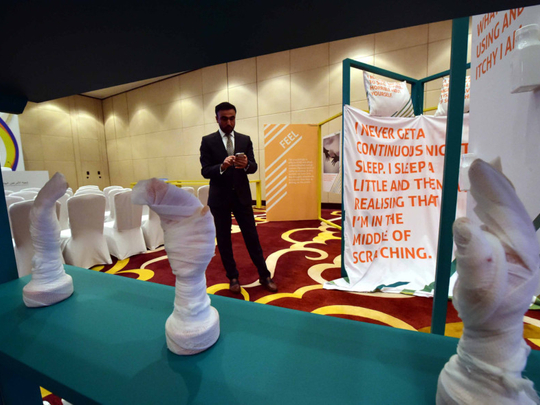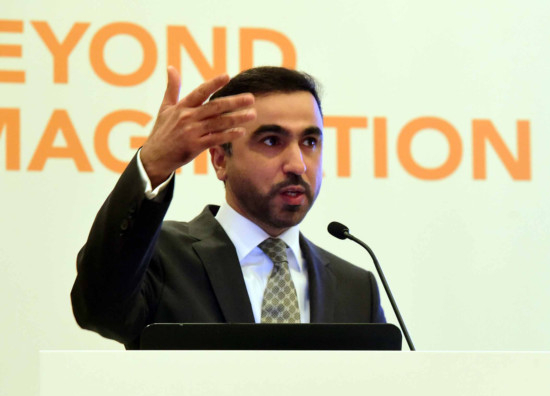
Dubai: A new injection to treat moderate and severe atopic dermatitis, often known as eczema, is now available in the UAE, making it one of five countries in the world to offer the treatment, said a top dermatologist on Tuesday during a press conference by the Emirates Dermatology Society.
Dr Anwar Al Hammadi, consultant and head of Dermatology at Dubai Health Authority (DHA) and DermaMed Clinic Dubai, said the skin condition, which causes patches of skin to become rough and inflamed with blisters causing itching and even bleeding, affects 10-25 per cent of children and around 10-20 per cent of adults.
“This is a very common condition, and no day will go by without a dermatologist seeing at least a few patients with atopic dermatitis. While it can appear at any time in children, it is less common in adults because most patients will grow out of eczema at some point,” he said.
While the age limit could vary, Dr Al Hammadi said roughly 60 per cent of children will grow out of eczema by the age of 12.
Doctors often prescribe eczema patients with atopic creams, which contain cortisone, but in some cases patients are also given immunosuppressant pills. However, the condition is known to be chronic and often returns to a patient with the same characteristics.
With no breakthroughs on advanced ways to treat eczema in the last 18 years, a new treatment, called ‘Dupilumab,’ created by Sanofi, a global biopharmaceutical company, offers patients hope. The treatments consists of one injection every two weeks for as long as recommended by the dermatologist to help treat cases of moderate to severe atopic dermatitis.
“We already have three patients who have taken the injections here in Dubai and are excited to see the results and feedback. This treatment is for cases where the eczema is not controlled with conventional therapy,” explained Dr Al Hammadi.
The injection treatment will be covered under some insurance packages, as discussions continue with insurance companies in Dubai.
“The efforts of the UAE Ministry of Health to accelerate availability of new innovative treatments for the patients in the UAE is, indeed, remarkable,” said Jean-Paul Scheuer, country chair and general manager of Sanofi Gulf Countries.
He pointed out the treatment was approved by the FDA in March 2017, and the European Medicine Agency in July 2017.
Diagnosis
Eczema is easily diagnosed as it is characterised by intense itching and chronic relapsing. It is usually seen in the creases on the arms and behind the knees, as well as wrists, ankles, shoulders and eyelids — although it can appear anywhere on the body.
Doctors often inquire about personal and family history of other atopic disorders such as asthma, and allergic rhino conjunctivitis known as hay fever.
“Most of the time we don’t need to go for a laboratory investigation or skin biopsy to confirm it is atopic dermatitis. We need to know about the family and personal history, whether there is itching, and if comes and goes- meaning if it keeps coming back,” explained Dr Al Hammadi.
Patients suffering from moderate to severe eczema can experience sleep disturbances, psychological distress, disrupted family dynamics, and impaired functioning at school or work.
Dr Al Hammadi said more than 50 per cent of eczema cases in children will present itself during the first year of life, while more than 85 per cent of cases are seen before the age of five.
Numbers from the dermatology centre at the DHA show that between 14-15 per cent of all cases in public dermatology clinics in Dubai are related to atopic dermatitis, he said.
Dr Al Hammadi further explained that statistics on the number of eczema cases in the Dubai is not inclusive due to several factors. “These numbers only represent government clinics, so it does not indicate the total number of cases, including the private sector. Many patients with eczema are disappointed and frustrated and are still using their medication and not seeking medical advice anymore. Many know their treatments and go straight to the pharmacy to purchase it,” he said.
The causes of eczema are often related to genetics, immunology, and the environment. Factors such as extreme cold temperatures as well as high UV light, tobacco smoke, pollution, and urban setting can also play a role in flaring up the condition.
Number of Eczema cases reported at the dermatology centre at the DHA:
Year: 2014
Number of patients in dermatology division: 19,224
Dermatitis cases: 2,777
Percentage: 14.4
Year: 2015
Number of patients: 20,556
Dermatitis cases: 3,086
Percentage: 15
Year: 2016
Number of patients: 20,788
Dermatitis cases: 2,953
Percentage: 14.2
Statistics on eczema worldwide
5-20% of children worldwide suffer from atopic dermatitis
11% or 102,353 children 17 years and below suffer from atopic dermatitis in the USA
14%: one-year prevalence of atopic dermatitis is seen in adults aged 30-89 years in Denmark
11% or 30,000 individuals suffer from atopic dermatitis aged 16-75 years in Sweden













